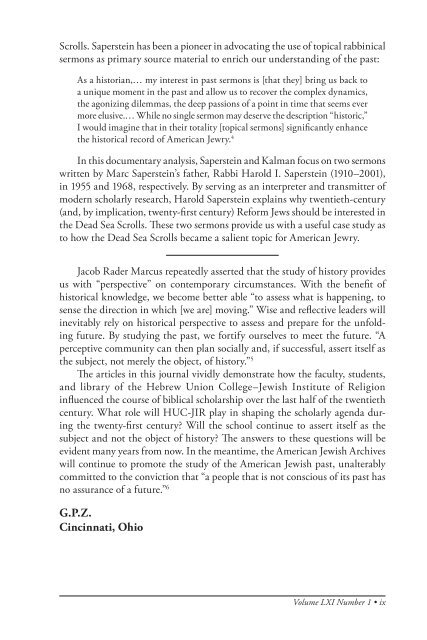The American Jewish Archives Journal, Volume LXI 2009, Number 1
The American Jewish Archives Journal, Volume LXI 2009, Number 1
The American Jewish Archives Journal, Volume LXI 2009, Number 1
You also want an ePaper? Increase the reach of your titles
YUMPU automatically turns print PDFs into web optimized ePapers that Google loves.
Scrolls. Saperstein has been a pioneer in advocating the use of topical rabbinical<br />
sermons as primary source material to enrich our understanding of the past:<br />
As a historian,… my interest in past sermons is [that they] bring us back to<br />
a unique moment in the past and allow us to recover the complex dynamics,<br />
the agonizing dilemmas, the deep passions of a point in time that seems ever<br />
more elusive.… While no single sermon may deserve the description “historic,”<br />
I would imagine that in their totality [topical sermons] significantly enhance<br />
the historical record of <strong>American</strong> Jewry. 4<br />
In this documentary analysis, Saperstein and Kalman focus on two sermons<br />
written by Marc Saperstein’s father, Rabbi Harold I. Saperstein (1910–2001),<br />
in 1955 and 1968, respectively. By serving as an interpreter and transmitter of<br />
modern scholarly research, Harold Saperstein explains why twentieth-century<br />
(and, by implication, twenty-first century) Reform Jews should be interested in<br />
the Dead Sea Scrolls. <strong>The</strong>se two sermons provide us with a useful case study as<br />
to how the Dead Sea Scrolls became a salient topic for <strong>American</strong> Jewry.<br />
Jacob Rader Marcus repeatedly asserted that the study of history provides<br />
us with “perspective” on contemporary circumstances. With the benefit of<br />
historical knowledge, we become better able “to assess what is happening, to<br />
sense the direction in which [we are] moving.” Wise and reflective leaders will<br />
inevitably rely on historical perspective to assess and prepare for the unfolding<br />
future. By studying the past, we fortify ourselves to meet the future. “A<br />
perceptive community can then plan socially and, if successful, assert itself as<br />
the subject, not merely the object, of history.” 5<br />
<strong>The</strong> articles in this journal vividly demonstrate how the faculty, students,<br />
and library of the Hebrew Union College–<strong>Jewish</strong> Institute of Religion<br />
influenced the course of biblical scholarship over the last half of the twentieth<br />
century. What role will HUC-JIR play in shaping the scholarly agenda during<br />
the twenty-first century? Will the school continue to assert itself as the<br />
subject and not the object of history? <strong>The</strong> answers to these questions will be<br />
evident many years from now. In the meantime, the <strong>American</strong> <strong>Jewish</strong> <strong>Archives</strong><br />
will continue to promote the study of the <strong>American</strong> <strong>Jewish</strong> past, unalterably<br />
committed to the conviction that “a people that is not conscious of its past has<br />
no assurance of a future.” 6<br />
G.P.Z.<br />
Cincinnati, Ohio<br />
<strong>Volume</strong> <strong>LXI</strong> <strong>Number</strong> 1 • ix

















